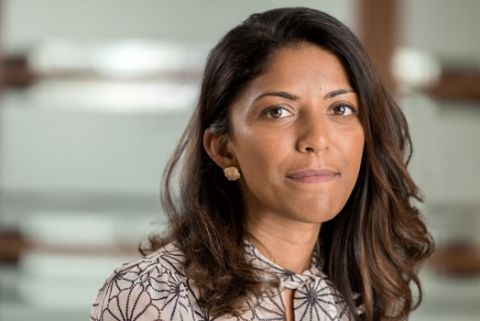
This Q&A is part of a series featuring faculty members joining Queen’s Law this summer. 2018 is a banner year for faculty hires, with the addition of seven new professors to the school’s roster of exceptional scholars. All of these new talented researchers have already earned international recognition in their fields.
Upon arriving in Kingston, Professor Ashwini Vasanthakumar spoke with Queen’s Law Reports to share her professional and personal interests.
Why did you decide to join Queen’s Law?
In addition to being a top law school in Canada, Queen’s is an exciting place to be doing theory – it has a dynamic and growing community of scholars who also collaborate closely with colleagues in the politics and philosophy faculties. So, it was an ideal intellectual home for me, given my training in law and political theory. I am thrilled to be building my career back home and at such a dynamic law school. I wanted to come home, and this is precisely the sort of place where I wanted to come home to.
What got you interested in your area of law?
My work is primarily in normative theory: I focus on how things ought to be in politics and law. I started my liberal arts education obsessed with Russian history but then discovered analytical political philosophy: what I discovered to be a lifelong argument about justice, political life, and personal ethics. I am interested in the law as a particular extension and expression of these considerations about justice. As lawyers, we are hugely privileged to have at our disposal a tool that might actually make a difference in someone’s life. Unfortunately, legal and political theory easily sound esoteric and far removed from the practice of law. This is not true. Legal doctrines, including in private law, often rely explicitly on normative considerations and implicitly draw on a background theory of justice. Arguments about constitutional interpretation are, among other things, arguments of political theory. And practitioners, in any area of law, confront complex ethical dilemmas.

Tell us about your research.
My current research is focused on the political lives of migrants and the victims of oppression. I’m completing my first book, The Ethics of Exile: a political theory of diaspora, which looks at the duties and rights that exiles have in the communities they have fled and the various roles they play in homeland politics. For good reason, scholars and policymakers focus on the duties owed to those fleeing persecution and conflict; but, I think it is also important to tell the other side of the migration story, and to examine the political relationship between political communities and those who have left. Given the scale of global migration and the technological capacities for emigrants to remain connected, emigrant communities and their descendants – diasporas – are poised to have an enduring role in the countries they have left. We see this in the role that diasporas play in civil conflicts in their countries of origin, but also in more conventional politics: emigrant diasporas, for example from Mexico and Turkey, have proven to be powerful constituencies in recent elections.
My future research will focus on theorising injustice and the duties and permissions that exist when we confront an unjust political order. So much of analytical political theory begins with the reasonably just state. I’m not sure we, or many of us, have lived in a reasonably just state. And I am interested in exploring what political authority and legitimacy mean in an unjust state, and what it requires of dutiful citizens. We often conflate political obligation with complying with the law; if anything, the last few years have shown us that the most dedicated citizens are those who challenge the law.
What are you most proud of?
A recent accomplishment was acquiring a paella dish, although using it has proven to be an entirely separate matter. I’m also very proud of my niece and nephew although I can't take any credit for their general awesomeness.
Any hobbies or interests?
Reading, movies, traveling, the occasional and leisurely run. Not cooking, sadly, although I remain optimistic.